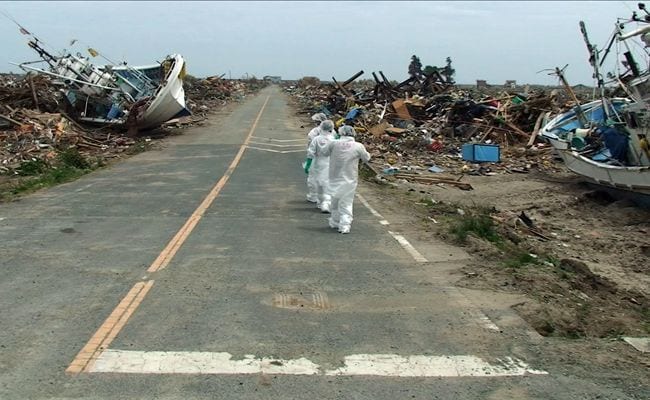
When the March 11, 2011 tsunami destroyed many of their homes, and radiation from the crippled Fukushima Daiichi nuclear power plant rendered the region uninhabitable, the people of Futaba Town fled to a Tokyo shelter. Long after the world media had moved on to the next crisis, director Atsushi Funahashi kept his camera trained on the residents as they made the best of their lives as refugees. The resulting documentary, Nuclear Nation, reckons the human cost of the disaster, and exposes the policies and economic practices still in place that almost ensure that such another nuclear catastrophe will happen.
The film covers the rest of 2011, and is divided into seasons, starting with spring. A shot of cherry blossoms establishes early one of the documentary’s themes: the fact that the townspeople’s predicament is localized amplifies their frustrations at delays in reparation from the power utility or government. The season of rebirth proceeds as usual for the rest of Japan, but not for them.
Another marker of passing time marks the disintegration of community: periodically, a tally of the number of evacuees remaining in the shelter appears, the lessening number pointing to the permanent relocation of some residents.
Wherever they live, the survivors struggle with memories. A father and grown son, Ichiro and Yuuichi Nakai, mourn the loss of a wife and mother to the tsunami. Katsutaka Idogawa, the mayor of Futaba, is riven with regret and doubt about having tied the town’s fortunes to the power plant. Masami Yoshizawa maintains his herd of cattle, 14 km from the explosion, even though he knows he can’t sell the contaminated animals. “My destiny is linked with theirs,” he explains.
Yoshizawa isn’t the only one to speak of destiny. “They found Grandma just the other day,” says one resident, lamenting the high number of bodies yet to be recovered and identified. “This is our destiny,” he continues. “We suffered and worked hard. We built a house and it all disappeared.”
Mayor Idogawa is less resigned to the destiny of Futaba, for which he feels personally responsible. As the film unfolds, he details the history of the town and its 50 year relationship with the nuclear power plant, as well as his own disillusionment.
Money from the plant and the jobs it provided raised the standard of living—at first. Cars replaced motorbikes, and rice farming was mechanized. Houses became larger and more modern. When the 5 and 6 reactors opened in town in the late 1970s, “nuclear” money made up half of the town’s revenue. With this influx of funds, Idogawa and other leaders built a number of public buildings and made improvements in the town’s infrastructure.
But because power plants depreciate so quickly, the town’s wealth didn’t last. In 2007, Futaba had become “one of the 10 poorest towns in Japan”, and was close to bankruptcy. In an attempt to reverse the town’s fortunes, Idogawa had arranged for funding to build two new reactors. Construction for these reactors would have started in April 2011.
Over the course of the film, we see Idogawa change from booster to anti-nuclear power activist. He tells a government commission that the utility and government lied and continue to lie about the dangers of nuclear power and the effects of the radiation to which the townspeople have already been exposed. Accusing the government of making plans to buy land in the exclusion zone, he declares, “I won’t let Futaba get wiped off the face of the Earth.”
The mayor connects Futaba’s plight to other displaced populations. “People on disputed territory are dealing with it too. It’s that refugee feeling that I never want to pass on to future generations”. In a video message to the Berlin Film Festival, included as one of two DVD extras, he amplifies his anti-nuclear power message.
Like the citizens of the greater Futaba area, who stage a march, chanting “Don’t you forget us!” “Give us back our Futaba!”, Mayor Idogawa knows residents can never get their town back, not the way it was. What they want is acknowledgement of the wrong they have suffered.
Funahashi, who in a brief television interview included as the other DVD extra makes it clear he shares Idogawa’s perspective, fills Nuclear Nation with conventions from post-apocalyptic science fiction. You could, in fact, call it a pre-apocalyptic cautionary tale. The opening shot is of the wind-swept, partially destroyed plant, forlorn of any signs of human activity. The film closes with another long shot of the plant looming behind a stand of mist-shrouded trees.
One harrowing sequence documents the abandoned cattle who died in their stalls of starvation and dehydration, with languorous pans of their desiccated bodies as horrific as a scene from The Walking Dead. The abandoned Tokyo school where Futaba residents are housed is described as “a modern-day Noah’s Ark for those escaping radiation.” While the Fukushima disaster may have been contained, Nuclear Nation hints that a nuclear catastrophe of Biblical proportions may be next.


![Call for Papers: All Things Reconsidered [MUSIC] May-August 2024](https://www.popmatters.com/wp-content/uploads/2024/04/all-things-reconsidered-call-music-may-2024-720x380.jpg)



